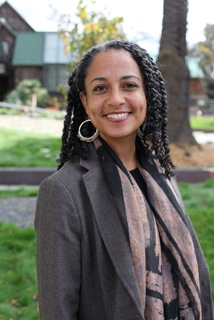Reflections on Trayvon, the Zimmerman Verdict, and Blackness in America
 Na’ilah Suad Nasir
Na’ilah Suad Nasir
July 2013
George Zimmerman is not guilty? As a scholar who studies identity, race, and African American youth I see this moment as continuous with the moments that African American youth report everyday. Moments where black young people are racialized in problematic ways by adults in schools, by police officers in their neighborhoods, by people on the street; I am reminded in particular of a 9th grader who got suspended for smiling in class—his smile was viewed by the teacher as insubordination, or of another young African American man commenting on how he is feared by others as he walks down the street. These contemporary moments experienced by youth harken back to a long historical record and a system, really multiple interlocking systems—the criminal justice system, the educational system, the political system, the economic system—that marginalize black people, that fail to protect us, that fail to meet our needs in a myriad of ways.
My scholarly research helps me know that the Trayvon Martin verdict is undeniably and inextricably linked to the ways that our society criminalizes black people, and black males especially. This happens in the images of black men that make their way into the music and the movies, and in the narratives that exist about what it means to be black and male. And in a time where actual black achievement is unprecedented, these narratives are as strong and as deadly as ever, perhaps made even more deadly in a generation of young people that don’t seem to feel the same press to fight for equity, that have not been taught that without vigilance all that we have fought for as a people can be eroded. The scholar in me is not surprised. The scholar in me knows that race and racial inequality are so deeply ingrained in the structure of our society so as to be unrecognizable by those who are privileged by it.
But as a mother, I am in shock. It is surreal that the world is still turning, that we continue on business as usual and that woman’s son is dead. I feel a deep sense of internal panic, like that feeling when your children are in danger and there is nothing you can do. I keep thinking, “What does it mean to live in a society that does not protect your children?” I have four children, the youngest of which is an 8-year-old African American boy. I have a 13 year old African American nephew who is already taller than I am. Both of them are goofy and kind hearted and innocent and loving and potentially subject to the kind of deadly harassment Trayvon experienced. The verdict in this case is symbolic; symbolic of the ways that black male life is not valued, the ways that black male childhood is left unprotected. What does that mean for the realities of parenting a black male child in such a society? It is a question I cannot answer.
I know that my parents’ generation is not at all surprised. They watched our black leaders gunned down in cold blood, lived through the FBI infiltration of the black power movement, saw their communities ravished by the crack cocaine epidemic. My grandparents’ generation is certainly not surprised. They witnessed dog attacks on peaceful protestors, lived through the extreme oppression of Jim Crow, and knew first hand the brutality of white supremacy and the lengths white people would go to preserve it. My generation, I think, is perhaps more likely to be in disbelief. We have, to some degree, come to see ourselves as integrated into the American systems as full citizens, we know racism certainly, but we also take for granted a certain set of rights and privileges. My hope is that this verdict reminds us to not get complacent, to model for our children the fight that is still necessary in this country, to remember that it is not enough to see black faces in positions of power if the systems we are a part of and represent still do not serve us.
But my prayer is for my children’s generation. I pray that they get angry, that they act assertively, that they understand that rights are lost in the same manner that they are gained—a little bit at a time.
Let this moment be a call to action; let it be a reminder to us that blackness is still a marker of “other” in this country, that without vigilance our protections in this country will most certainly regress, that it is time to draw on the historical record to remember what it means to have a collective agenda, to take collective action, to empower ourselves to create, and to demand, the kind of change we want to see
